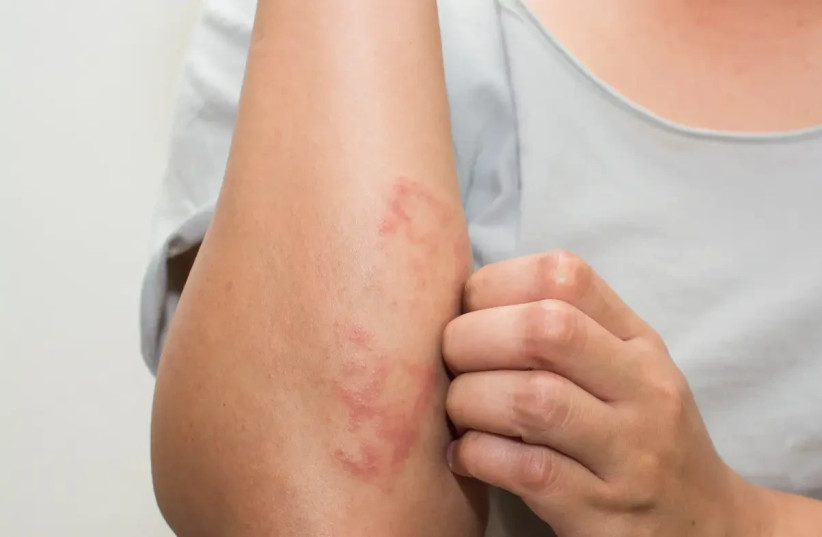The connection between stress and skin diseases has long been recognized in the medical field. Many of us have experienced emotional distress and mental strain, which can manifest as visible skin problems.
We are all familiar with those moments of stress and crisis when pimples or sores suddenly appear on our skin. For individuals with chronic skin conditions like herpes or psoriasis, stress can exacerbate their symptoms or trigger outbreaks.
Diseases: Mental and emotional
It is widely accepted that every disease has mental and emotional consequences, making it possible for skin symptoms to worsen or erupt due to emotional and mental difficulties. In this article, we will explore skin diseases that are known to worsen with stress and mental strain, along with recommended methods of treatment.
Psoriasis
Psoriasis is a common skin disease that affects over 2% of the population. It manifests as a rash covered in scales. Stress is known to cause flare-ups and aggravate the condition. If you experience an aggravation, it is recommended to seek a quick appointment with a dermatologist through online health services. In the meantime, proper skin moisturization is crucial and can serve as an initial treatment if immediate access to a doctor is not possible.
Seborrhea
Seborrhea is another common and chronic skin condition that can worsen in response to mental stress. It is often found on the face and scalp. Redness on the face can be soothed by using moisturizers containing skin-calming ingredients. It is important to avoid cosmetics and cleaning products that may irritate the skin and worsen redness.
Acne
Acne, a prevalent skin issue, is also known to worsen during stressful situations. It is noteworthy that children and young adults may be more susceptible to worsening acne due to disruptions in their routines and exposure to distressing information. During times of low mood, motivation to take care of the skin may decrease, leading to further deterioration. It is advisable to adopt a minimal treatment routine to maintain healthy skin. This routine should include washing the face once or twice a day with a dedicated face soap that reduces oil, as well as using an anti-acne preparation daily. There are numerous over-the-counter acne treatments available for those without severe symptoms. However, if acne significantly worsens, consulting a dermatologist and obtaining prescriptions for topical preparations or medications is essential. Establishing a skincare routine not only prevents symptom aggravation but also serves as a distraction and aids in tension relief.

Practical tips for skin care:
Skin asthma and general itching are conditions heavily affected by mental stress and tension.
An effective treatment routine is necessary, which includes massaging the skin with shower oil instead of soap and applying regular moisturizer after showering. If symptoms worsen, it is recommended to consult a dermatologist for prescriptions of active preparations that can be applied or taken orally. Sometimes, simply using a moisturizer and soap containing moisture can alleviate itching. It is important to avoid using excessively hot water during showers and reduce showering frequency. Additionally, thorough handwashing is crucial.
Proper nutrition plays a vital role in treating the skin. While external preparations are important, they are not sufficient. Consuming natural foods that provide essential fatty acids and vitamins necessary for the skin is recommended. Conversely, minimizing the consumption of carbohydrates, processed foods, food colorings, and fried foods is advisable.
Maintaining hygiene is especially important for individuals with seborrhea. To prevent flare-ups or reduce symptoms, daily basic hygiene should be practiced, ensuring thorough cleansing from head to toe. It is crucial to use gentle cleansers suitable for sensitive and allergic skin. The cleansing routine should include makeup removal, thorough cleansing using face soap, and completing the process with face water, preferably performed in the morning and evening.
For those with acne, adhering to a cleaning and care routine is vital. Using facial soap daily helps maintain clean and smooth skin. A cleansing gel enriched with manuka oil is recommended for oily skin prone to pimples, as it aids in maintaining skin hygiene. After cleansing the face, it is advised to use a low-fat moisturizer to balance sebum secretion and soothe the skin. For pimple treatment, a spot treatment suspension that absorbs excess oil and shrinks pores can be beneficial.
Lastly, it is essential to work on reducing anxiety levels, although it may be challenging, especially in challenging times. Mutual support, sharing, understanding, and patience are key in times when anxiety and stress levels are high. Encouraging and comforting one another through heartfelt conversations can significantly reduce stress levels and improve facial skin conditions.
